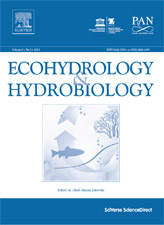Ecohydrology concept
Ecohydrology is a subdiscipline of hydrology focused on ecological aspects of hydrological cycle
The increasing human population has resulted in increasing pollution and degradation of water and biogeochemical cycles at a basin scale. Declines of water quality and biodiversity at a global scale are sobering evidence that the prevailing hydrotechnical approach in water management, focused on sewage treatment plants and regulation of hydrological processes such as floods and droughts, are crucial but not sufficient. To achieve sustainable water management it is necessary to develop a complementary new approach. This new approach should be based on the recent progress made in understanding the functioning of aquatic and terrestrial biota.
Ecohydrology key hypotheses (Zalewski 2000; Zalewski 2004):
- Hypothesis H1: "The regulation of hydrological parameters in an ecosystem or catchment can be applied to control biological processes".
- Hypothesis H2: "The shaping of the biological structure of an ecosystem(s) in a catchment can be applied to regulate hydrological processes".
- Hypothesis H3: "Both types of regulation integrated at a catchment scale and in a synergistic way can be applied to the sustainable development of freshwater resources, measured as the improvement of water quality and quantity (providing ecosystem services)".
It should be stressed that according to the ecohydrology concept, the overall goal defined in the above hypotheses is enhancement of ecosystem carrying capacity for ecosystem services and resilience, resilience to anthropogenic stress.
Ecohydrology principles:
- HYDROLOGICAL (framework): integrating of understanding water and biota interplay at a catchments scale (GIS) for identification of threats and opportunities for sustainable water, economy and society. It covers such aspects as:
- scale: mesocycle water circulation in a basin - the template for quantification of ecological processes;
- dynamics: water and temperature - the driving forces for terrestrial and freshwater ecosystems;
- hierarchy of factors: abiotic factors to hydrology dominate, however, when these are stable and predictable, biotic interactions begin to manifest themselves
- ECOLOGICAL (target): understanding of the evolutionarily established resilience and resistance of ecosystems to stress and patterns of ecological succession to increase their carrying capacity against human impacts.
- ECOLOGICAL ENGENEERING (methodology): using ecosystem properties as a management tool for restoration of biodiversity, improve water quality and enhancement of ecosystem services for society by:
- dual regulation of hydrology by shaping biota and, vice versa, regulation of biota by altering hydrology;
- integration: at the basin scale various types of regulations should be integrated towards achieving synergy to stabilize and improve the quality of freshwater resources at a basin scale
- harmonization of ecohydrological measures with necessary hydrotechnical solutions (e.g., sewage treatment plants, levees in urbanized areas, etc.)
Background publications:
Zalewski, M., Janauer, G.A., Jolánkai, G. 1997. Ecohydrology. A new paradigm for the sustainable use of acquatic resources. Conceptual background, working hypothesis, rationale and scientific guidelines for the implementation of the IHP-V Projects 2.3/2.4. IHP-V Technical Documents in Hydrology No. 7, UNESCO, Paris, pp. 58
UNESCO IHP, 1998. Ecohydrology. A list of scientific activities of IHP-V Projects 2.3/2.4. IHP-V Technical Documents in Hydrology No. 21, UNESCO, Paris, pp. 59
Zalewski, M. (Ed.) 2002. Guidelines for the Integrated Management of the Watershed. Phytotechnology and Ecohydrology. UNEP-DTIE-IETC, UNESCO-IHP, Freshwater Management series No. 5., Osaka, Siga, pp. 188.
Zalewski M., Wagner-Lotkowska I. (Eds.) 2004. Integrated Watershed Management - Ecohydrology & Phytotechnology - Manual. UNEP-DTIE-IETC, Osaka, Siga, pp. 208.
UNESCO IHP-VII: Water dependencies: systems under stress and societal responses.
Theme 3. Ecohydrology for sustainability
 Home
Home |
Ecohydrology concept |
Editors |
Archives |
Subscription
 design: neurino, strony www Łódź
design: neurino, strony www Łódź





